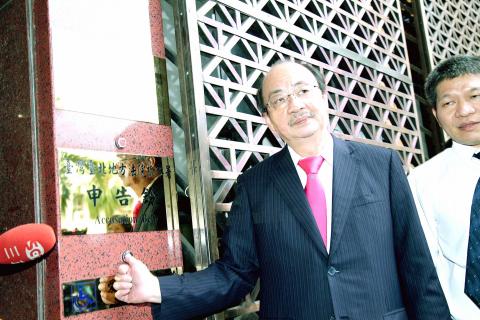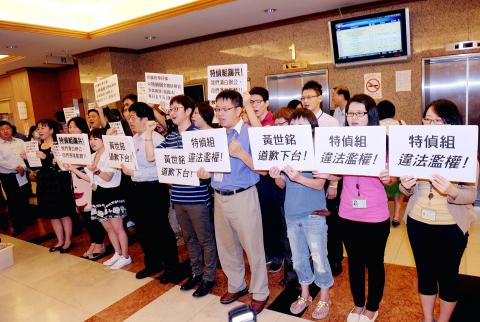Democratic Progressive Party (DPP) caucus whip Ker Chien-ming (柯建銘) yesterday filed a lawsuit against President Ma Ying-jeou (馬英九) and Prosecutor-General Huang Shih-ming (黃世銘) over the leaking of secrets in a wiretapping scandal, saying that the Ma administration’s “governance by secret agents” has to be stopped.
Accompanied by DPP lawmakers, Ker filed the lawsuits at the Taipei District Prosecutors’ Office, accusing Ma of instigating the leaking of secrets and leaking secrets, and Huang of several offenses, including leaking secrets, defamation, leaking personal information, providing false statements, malicious persecution and suppression of evidence.
“This is the first lawsuit I have filed in my life, but it is one I have to file because I want to end the evil of governing by secret agents with this lawsuit and tell Taiwanese how the Ma administration has resorted to wiretapping and manipulation of the judiciary to oppress the DPP,” Ker said.

Photo: David Chang, EPA
Ker said he filed the lawsuit with the aim of securing evidence — the Special Investigation Division’s (SID) wiretaps, which were used by Ma and Huang to accuse the veteran lawmaker of asking Legislative Speaker Wang Jin-pyng (王金平) to lobby for him in a legal case, as well as records of telephone calls between Ma and Huang, who he suspects of conspiring against Wang and himself.
Huang’s announcement that Wang and Ker had been involved in misconduct at a press conference on Sept. 6 kicked up a political storm, in which Ma has been accused of pursuing a political vendetta against Wang and the DPP, and infringement of the constitutional mechanism. The SID has been accused of excessive and illegal wiretapping of the legislature.
Ma and Huang have also been questioned about their meetings and telephone conversations, which some legal experts say were a violation of the Constitution.

Photo: CNA
Citing the example of the Watergate scandal in the US, Ker said former US president Richard Nixon was forced to resign when a court demanded that Nixon hand over the wiretaps and that was why securing the evidence would be important.
“I have never been someone who likes to sue people, but I can only secure the evidence and directly confront the defendants as a litigant,” Ker said.
While the Bureau of Investigation claimed that it did not begin to tap the DPP caucus whip’s phone until March 19 last year, Ker insisted that he has been bugged for more than five years.
Ker said he had not filed the lawsuits to benefit himself, but for the whole nation as “governance by secret agents should be eliminated and constitutional order restored.”
Meanwhile, the Alliance of Wiretap Victims, most of its members assistants to lawmakers, yesterday told a press conference that it had launched a petition and plans to file a lawsuit against the SID demanding compensation of up to NT$300 million (US$10 million).
By wiretapping the telephone conversations of the entire legislature, the SID had violated the Communication Security and Surveillance Act (通訊保障及監察法) and the Personal Information Protection Act (個人資料保護法), the alliance said.
“[The wiretaps] are a disgrace to democracy and a disgrace to Taiwan. Ma, Premier Jiang Yi-huah (江宜樺) and Huang should immediately step down,” said Chiang Chao-kuo (江肇國), a lawmaker’s assistant.

Conflict with Taiwan could leave China with “massive economic disruption, catastrophic military losses, significant social unrest, and devastating sanctions,” a US think tank said in a report released on Monday. The German Marshall Fund released a report titled If China Attacks Taiwan: The Consequences for China of “Minor Conflict” and “Major War” Scenarios. The report details the “massive” economic, military, social and international costs to China in the event of a minor conflict or major war with Taiwan, estimating that the Chinese People’s Liberation Army (PLA) could sustain losses of more than half of its active-duty ground forces, including 100,000 troops. Understanding Chinese

The Ministry of Foreign Affairs (MOFA) yesterday said it is closely monitoring developments in Venezuela, and would continue to cooperate with democratic allies and work together for regional and global security, stability, and prosperity. The remarks came after the US on Saturday launched a series of airstrikes in Venezuela and kidnapped Venezuelan President Nicolas Maduro, who was later flown to New York along with his wife. The pair face US charges related to drug trafficking and alleged cooperation with gangs designated as terrorist organizations. Maduro has denied the allegations. The ministry said that it is closely monitoring the political and economic situation

‘SLICING METHOD’: In the event of a blockade, the China Coast Guard would intercept Taiwanese ships while its navy would seek to deter foreign intervention China’s military drills around Taiwan this week signaled potential strategies to cut the nation off from energy supplies and foreign military assistance, a US think tank report said. The Chinese People’s Liberation Army (PLA) conducted what it called “Justice Mission 2025” exercises from Monday to Tuesday in five maritime zones and airspace around Taiwan, calling them a warning to “Taiwanese independence” forces. In a report released on Wednesday, the Institute for the Study of War said the exercises effectively simulated blocking shipping routes to major port cities, including Kaohsiung, Keelung and Hualien. Taiwan would be highly vulnerable under such a blockade, because it

UNRELENTING: China attempted cyberattacks on Taiwan’s critical infrastructure 2.63 million times per day last year, up from 1.23 million in 2023, the NSB said China’s cyberarmy has long engaged in cyberattacks against Taiwan’s critical infrastructure, employing diverse and evolving tactics, the National Security Bureau (NSB) said yesterday, adding that cyberattacks on critical energy infrastructure last year increased 10-fold compared with the previous year. The NSB yesterday released a report titled Analysis on China’s Cyber Threats to Taiwan’s Critical Infrastructure in 2025, outlining the number of cyberattacks, major tactics and hacker groups. Taiwan’s national intelligence community identified a large number of cybersecurity incidents last year, the bureau said in a statement. China’s cyberarmy last year launched an average of 2.63 million intrusion attempts per day targeting Taiwan’s critical